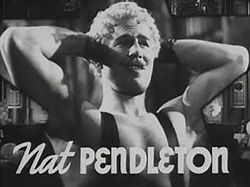Top Qs
Timeline
Chat
Perspective
Nat Pendleton
Olympic wrestler and actor (1895–1967) From Wikipedia, the free encyclopedia
Remove ads
Nathaniel Greene Pendleton (August 9, 1895 – October 12, 1967) was an American Olympic wrestler, film actor, and stage performer.[3] His younger brother, Edmund J. Pendleton (1899–1987), was a well-known music composer and choir master and organist for the American Church in Paris.

Remove ads
Early life
Nat Pendleton was born as Nathaniel Greene Pendleton in 1895 in Davenport, Iowa to Adelaide Elizabeth (née Johnson) Pendleton (1873–1960) and Nathaniel Greene Pendleton (1861–1914), an attorney,[4] who was reportedly a descendant of American Revolutionary general Nathanael Greene.[5][6] By March 1899, the Pendletons had moved to Cincinnati,[7] and then later to New York. Nat went to Brooklyn's Poly Prep High School.[8] Nat studied at Columbia University, graduating in 1916.[9] Pendleton spoke four languages, received an economics degree, and, in 2006, was inducted into the Columbia wrestling hall of fame.[9]
Remove ads
Wrestling career
Summarize
Perspective
Pendleton began his wrestling career at Columbia University, and served as captain of the school's wrestling team.[6] He was twice Eastern Intercollegiate Wrestling Association (EIWA) champion in 1914 and 1915. Chosen to compete on the United States wrestling team at the 1920 Summer Olympics in Antwerp, Belgium, Pendleton lost only one match during the competition and was awarded a silver medal.[10] Some controversy continues to surround that outcome. Both Pendleton's Olympic coach, George Pinneo, and his teammate, Fred Meyer, insisted that he won his final match and should have been awarded the gold medal. Pinneo later recalled that loss as the "most unpopular of many unsatisfactory decisions," and Meyer stated, "Pendleton was the winner of that contest, no ifs or buts."[11]
Returning to the US he became a professional wrestler and teamed up with promoter Jack Curley. Curley was aggressively promoting Pendleton and issued a series of haughty challenges, among them boasting that Pendleton could beat Ed "Strangler" Lewis and any other wrestler on the same night. John Pesek was enlisted to face Pendleton, and in a legitimate contest held on January 25, 1923, Pesek defeated and injured Pendleton.[12][13][14] Pendleton continued to wrestle professionally into the 1930s.
Remove ads
Stage career
Film career
Summarize
Perspective
Pendleton began appearing in Hollywood films in uncredited parts and minor roles by the mid-1920s. Pendleton was cast in at least 94 short films and features, most often being typecast in supporting roles, usually as "befuddled good guys" or as slow-witted thugs, gangsters, and policemen.[6] He appeared in the 1932 comedy Horse Feathers starring the Marx Brothers, performing in that film as one of two college football players who kidnap Harpo and Chico. In the 1936 production The Great Ziegfeld, he portrays the circus strongman Eugen Sandow, a role that brought him the best reviews of his career.
Pendleton appeared again as a circus strongman in the Marx Brothers' 1939 feature At the Circus. He can be seen as well in recurring roles in two MGM film series from the 1930s and 1940s. He played Joe Wayman, the ambulance driver, in MGM's Dr. Kildare series and in its spin-off series Dr. Gillespie. He also portrayed New York police lieutenant John Guild in The Thin Man series. His final screen appearances were in the 1947 releases Scared to Death with Bela Lugosi and Buck Privates Come Home starring Abbott and Costello.
Although Pendleton's professional career outside the wrestling ring was predominantly devoted to film work, he also performed in some stage productions, including in the Broadway plays Naughty Cinderella in 1925 and The Gray Fox in 1928.[6]
Remove ads
Personal life
Pioneer actor and director of the early American silent film era, Arthur V. Johnson, was his uncle. His siblings include: Steve (1908–1984), an American film and television actor,[16] and Edmund (1899–1987), a well-known music composer and choir master and organist for the American Church in Paris.
On the 1920 census, he was working as a sports manager, living in Manhattan, with his Puerto Rican wife, Juanita Alfonzo (age 22), and Ramon Alfonso (age 13), his wife's brother.[17]
Pendleton died in a San Diego, California hospital in 1967 after suffering a heart attack.[6][18] He was survived by his second wife, Margaret Evelyn "Barbara" Carse.[19]
Remove ads
Legacy
Pendleton is a member of several halls of fame: the Glen Brand Wrestling Hall of Fame in Waterloo, Iowa,[20] the Iowa Wrestling Hall of Fame in Cresco, Iowa,[21] and the Columbia University Athletics Hall of Fame.[22] He is the subject of a biography by Mike Chapman, which was published in 2015.[23][24][25]
Filmography
Remove ads
References
External links
Wikiwand - on
Seamless Wikipedia browsing. On steroids.
Remove ads


